KK-stiftelsens profilsatsning
KK-stiftelsens profilsatsning
KK-stiftelsens profilsatsning
Create successful ePaper yourself
Turn your PDF publications into a flip-book with our unique Google optimized e-Paper software.
<strong>KK</strong>-<strong>stiftelsens</strong> <strong>profilsatsning</strong><br />
1.2.2 Recommendations<br />
Earlier evaluations of the Knowledge Foundation’s focus on research<br />
projects, platforms and profiles have recurrently pointed out critical factors<br />
in the development of strong research environments. Hence, we focus on<br />
improvements not yet realised and recommendations that will hopefully<br />
encourage research environments and financiers to take another step<br />
forward.<br />
Research environments<br />
• Formulate a clear science vision pointing out what it means to be worldclass<br />
and prepare strategies for how to achieve this. Give early attention<br />
to the need for consolidation and refining of research results with a<br />
view to making a scientific breakthrough.<br />
• Distinguish between BECOMING a strong research environment and<br />
BEING one. Do not miss the opportunity to show a more daring attitude<br />
when there are good results to capitalise on. An established identity<br />
may need a finishing touch and be communicated and utilised to<br />
influence the surrounding society in a wider sense in order to be able to<br />
advance in the eyes of financiers and others.<br />
• Initiate a discussion among potential collaborators about the short and<br />
long-term potential in ‘open innovation’. Make use of the need for<br />
balance between industry relevance and scientific excellence as a<br />
starting point for argumentation. Agree on a strategy and policy for how<br />
to disseminate the results in wider circles, both in academia and<br />
industry.<br />
Financiers<br />
• Replace traditional mid-term and final evaluations with different types<br />
of ongoing evaluation. This should include self-evaluations and the<br />
structured exchange of experiences between players in similar research<br />
environments. Arrange for a continuous use of both national and<br />
international experts (peer reviews) at critical development stages in the<br />
research environment.<br />
• Design a performance management system with indicators illustrating<br />
the research environment’s development steps and benefits (the<br />
research environment as a result itself), rather than quantitative<br />
measures as PhDs, publications etc. Connect the system to goals and<br />
objectives as well as criteria for applications, financial allotments and<br />
merit rating.<br />
10



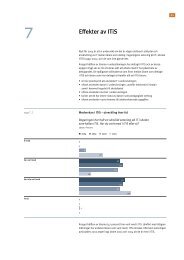
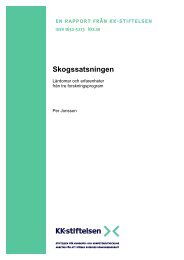
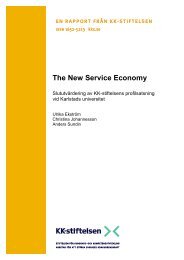
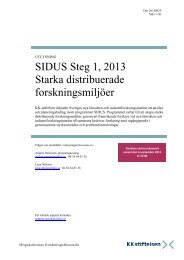
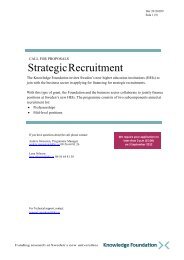
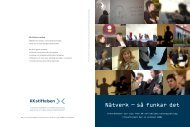
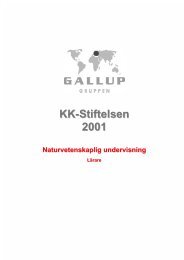



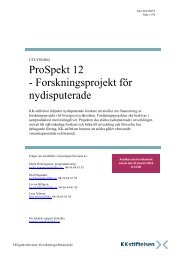
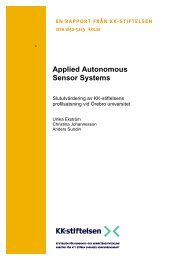

![[Klicka här och skriv titel] - KK-stiftelsen](https://img.yumpu.com/23861299/1/184x260/klicka-har-och-skriv-titel-kk-stiftelsen.jpg?quality=85)